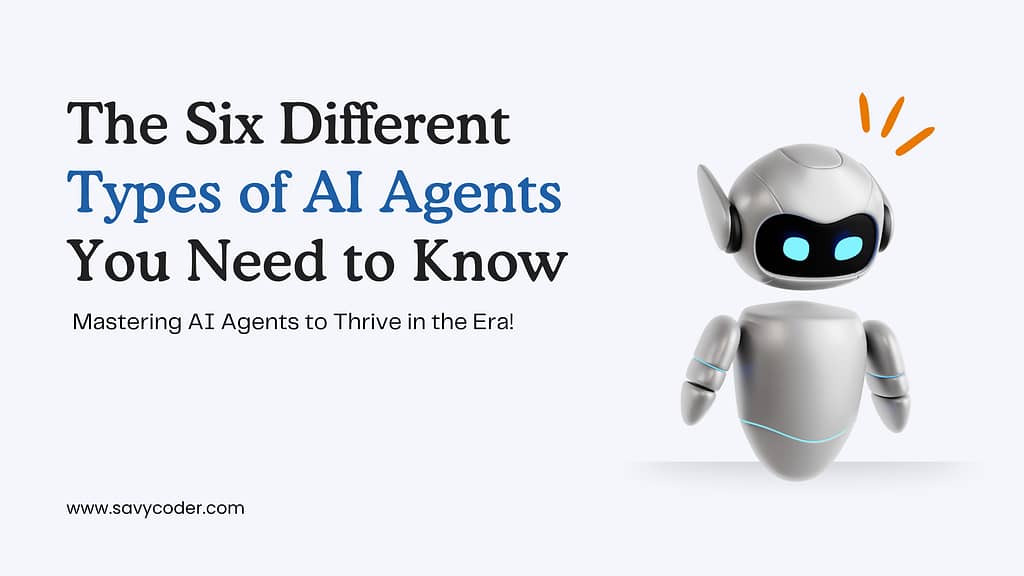The Six Different Types of AI Agents You Need to Know: Easy Guide!
- June 11, 2025
In this rapidly changing era of AI, you may have heard the term AI agent quite a few times. Whether you’re diving into machine learning, exploring automation, or considering a career in artificial intelligence to build smart systems that interact with the world, it’s essential to understand what an AI agent is and why it’s such a core concept in this field.
As Elon Musk once said,
“AI doesn’t have to be evil to destroy humanity. If AI has a goal and humanity just happens to be in the way, it will destroy humanity as a matter of course without even thinking about it.”
This highlights the importance of understanding how AI agents operate and the decision-making processes they employ. So let’s explore the types of agents in AI and what makes each one unique.

What Is an AI Agent?
An AI agent is a system that can perceive its environment and take actions that affect that environment. These systems are designed to operate autonomously, meaning they can function with minimal or no human guidance.
Think of an AI agent like a smart assistant. It listens to your requests (input), figures out what you mean, processes the information, and then takes action. From virtual assistants to self-driving cars, AI agents are behind the scenes, processing data and making real-time decisions.
Core Functions of AI Agents
AI agents are the “doers” of the AI world. To understand the role of an AI agent, it is helpful to examine what they do. Their operation typically involves three main capabilities:
Sensing
Agents gather information from their environment through sensors. This could be anything from a camera in a robot to software code reading data from a website.
Reasoning
Once the data is gathered, the agent interprets it using logic, rules, or learning models. It assesses the situation and determines the next best step.
Acting
Finally, the agent carries out an action, whether it’s controlling a mechanical component or generating a piece of output, such as a chatbot reply. All these steps combined make up the feedback loop that drives intelligent behavior.
Types of Agents in AI
Now that we understand what AI agents are, let’s look at the different types. Each type varies in how it perceives and reacts to its environment.
Simple Reflex Agents
These agents operate on condition-action rules. If X happens, do Y. They don’t consider the past or plan for the future. A good example is a basic robot vacuum that turns on when it hits an obstacle.
Model-Based Reflex Agents
Unlike simple reflex agents, these have a model of the world. They remember some past information, which helps them make more informed decisions. This makes them slightly more advanced.
Goal-Based Agents
These agents can evaluate different actions by considering a specific goal. They don’t just react, they plan. Think of a GPS system recalculating routes to get you to your destination.
Utility-Based Agents
These go a step further by assigning a “utility value” to possible outcomes. The agent chooses the action that maximizes overall benefit or happiness. This makes them more adaptable in complex situations.
Learning Agents
As the name suggests, these agents can improve over time. They learn from experience and adjust their behavior. Many machine learning applications fall under this category.
Knowledge-Based Agent in AI
One of the more sophisticated types, knowledge-based agents use a structured set of facts and rules to reason about the world. Let’s explore these in more detail.
Knowledge-Based AI Agents
A knowledge-based agent doesn’t just react, it reasons. These agents have access to a database of facts (called a knowledge base) and a set of inference rules that allow them to derive new conclusions or take informed decisions.
How it works:
- Knowledge Base: A structured repository of facts about the world is linked with the agent.
- Inference Engine: A logic-driven component that analyzes and draws conclusions from the knowledge base.
- Update Mechanism: Learns new facts or revises old ones based on new information.
Example Use Case:
In healthcare, a knowledge-based system could assist doctors by diagnosing diseases based on symptoms and past case data. These agents are beneficial in domains that require logical reasoning, such as legal advice systems, recommendation engines, or diagnostic tools.
Why Understanding AI Agents Matters?
You might wonder: “Is it necessary to know all this?” The answer is yes, if you’re looking to work with or understand intelligent systems.
Here’s why:
- Better System Design: Knowing the types of agents helps developers choose the right model for a given task.
- Smarter Decision-Making: Businesses can automate more effectively when they understand how agents think.
- Learning Advantage: If you’re taking an AI agents course, these concepts are foundational and will give you a strong base to build on.
Getting Started With AI Agents
If you’re ready to explore further, here’s how you can begin:
AI Tools to Explore
- Python or C: Widely used in AI development.
- Libraries like scikit-learn, TensorFlow, and OpenAI Gym are great starting points.
- Prolog: Excellent for logic-based and knowledge-driven systems.
- ROS (Robot Operating System): For robotics and agent-environment integration.
- N8n, Make, and Zapier to build AI automations.
Starter Project Ideas
- A personal assistant and social media manager.
- Content management system using AI automation.
- Build a basic chatbot that reacts based on user input.
- Create a rule-based quiz assistant.
- Simulate a game AI that adapts and learns strategies over time.
Final Words
AI agents are a key part of intelligent system design. They perceive, think, and act often with a level of independence that mimics human behavior. From simple reflex tasks to advanced decision-making through knowledge-based agents, these systems are shaping how AI integrates into our world.
So, whether you’re diving into an AI agents course or just curious about how intelligent decisions happen behind the scenes, understanding these agents is a crucial first step.
So that’s all for this blog. If you find it helpful, do let me know in the comments and share with your friends. Send me a message to get free research on any niche-relevant topic.
Sharing is Caring…
Recent Posts
-
10 Easy Gemini AI Prompts to Generate Viral Boy Images
-
How to Humanize AI Content: Easy Steps That Actually Work
-
The Six Different Types of AI Agents You Need to Know: Easy Guide!
-
How to Write a Resignation Email Template? 10 Professional Samples
-
Is selling on Etsy Worth it? Revealing Truth About Profits & Risks
-
Elevate Pay Important Update: Move Out Your Funds Before It's Too Late!
Freelancing
-
Is selling on Etsy Worth it? Revealing Truth About Profits & Risks
-
Elevate Pay Important Update: Move Out Your Funds Before It's Too Late!
-
New Ways to Earn Money Online in Pakistan Without Investment
-
The Best Shopify Payment Gateway in Pakistan - Sell Globally Now!
-
Easypaisa Payment Gateway: All You Need to Know to Boost Sales
-
10 Only the Best Legit Side Hustles for Women Now
Shopify
-
How to Set Up a Shopify Store without a Template? All You Need to Know
-
How to Cancel Shopify Subscription? Easy Tutorial Now!
-
How to Add Another Admin to Shopify? Quick Tutorial!
-
How to add Store Locator on Shopify for FREE? Easy Tutorial!
-
How to Create and Send Email Campaigns in Shopify for FREE?
-
How to Create and Use Collections in Shopify? High Traffic!

